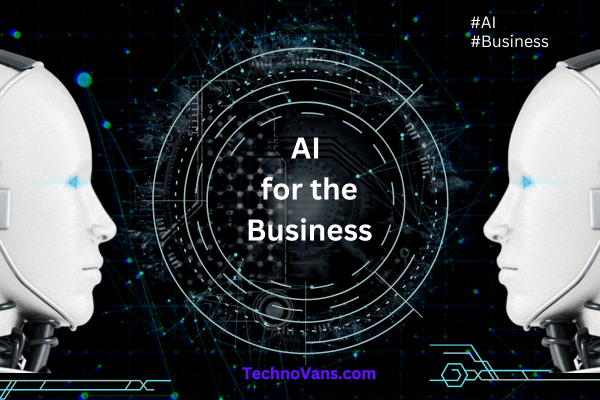How to Use AI for the Benefit of Business: A Comprehensive Guide
In today’s fast-evolving technological landscape, Artificial Intelligence (AI) is not just a buzzword; it’s a game changer for businesses across industries. From small startups to global enterprises, companies are finding innovative ways to leverage AI to streamline operations, enhance customer experiences, and drive growth. But how can businesses effectively harness the power of AI to their advantage?
This blog post will explore how businesses can use AI to optimize processes, improve decision-making, and stay competitive in an increasingly data-driven world.

How to Use AI for the Benefit of Business: A Comprehensive Guide
1. Streamlining Operations with AI Automation
One of the most powerful applications of AI for businesses is automation. AI technologies can be used to automate repetitive and time-consuming tasks, freeing up valuable time and resources for more strategic activities.
- Customer Service Automation: AI-powered chatbots and virtual assistants can handle routine customer inquiries 24/7. These systems can understand and respond to common questions, resolve issues, and even escalate complex problems to human agents when necessary. This results in improved customer satisfaction and reduced workload on customer service teams.
- Process Automation: Businesses can use AI to automate administrative tasks like scheduling, data entry, and even some aspects of financial management. Robotic Process Automation (RPA) combined with AI can analyze patterns in business workflows and suggest improvements, further reducing inefficiencies.
By integrating AI into business operations, companies can achieve greater efficiency, faster turnaround times, and reduced costs.
Also read – 7 Top Benefits of AI for Bloggers
2. Enhancing Decision-Making with Data Analytics
AI excels at processing and analyzing large volumes of data at speeds far beyond human capabilities. This makes it an invaluable tool for business decision-making. With AI-powered analytics, businesses can unlock insights from their data that would be difficult or impossible to detect manually.
- Predictive Analytics: AI algorithms can analyze historical data to predict future trends, customer behaviors, and market demands. For example, retail businesses can use AI to forecast inventory needs based on seasonal trends, while financial institutions can use predictive models to assess credit risk.
- Data-Driven Insights: AI can help businesses make more informed decisions by providing deep insights into customer preferences, sales patterns, and operational performance. With AI, business leaders can make decisions based on actionable data rather than gut feeling or intuition.
By making data-driven decisions, businesses can reduce risk, improve accuracy, and enhance strategic planning.
3. Personalizing Customer Experiences
Personalization is a key factor in improving customer satisfaction and loyalty. AI can help businesses understand individual customer preferences and deliver tailored experiences at scale.
- Recommendation Engines: AI is commonly used in e-commerce platforms, entertainment services, and even education to recommend products, services, or content based on a user’s past behavior. For example, Amazon and Netflix use AI-powered recommendation systems to suggest products and shows based on what users have previously viewed or purchased.
- Targeted Marketing: AI enables businesses to segment their customers more precisely and target them with personalized marketing messages. By analyzing customer data, AI can identify patterns and predict the likelihood of conversion, allowing businesses to optimize their marketing spend and increase ROI.
AI-driven personalization can improve engagement, build brand loyalty, and ultimately lead to increased revenue.
4. Improving Employee Productivity and Collaboration
AI can also play a significant role in improving workplace productivity and collaboration. Intelligent tools and applications can help employees perform their jobs more efficiently and effectively.
- AI-Powered Virtual Assistants: Tools like Microsoft’s Cortana or Google Assistant can help employees manage their calendars, set reminders, and even automate email responses, allowing them to focus on more important tasks.
- Collaborative Tools: AI-driven platforms such as Slack or Microsoft Teams use AI to enhance collaboration by suggesting relevant documents, automating workflows, or even summarizing meeting notes. These tools can help teams work more cohesively and save time on routine tasks.
- Talent Acquisition: AI can assist HR teams by screening resumes, conducting initial rounds of interviews through chatbots, and even analyzing employee performance data to suggest personalized development plans. This can help companies find and retain the best talent more efficiently.
5. Enhancing Security with AI
Cybersecurity is a growing concern for businesses of all sizes. As cyber threats become more sophisticated, AI can help businesses stay ahead of potential risks and protect sensitive data.
- Threat Detection and Response: AI can monitor network traffic and detect unusual patterns that might indicate a cyberattack, such as phishing, malware, or ransomware. AI systems can react in real-time, alerting security teams or even automatically neutralizing threats.
- Fraud Prevention: Financial services and e-commerce businesses can use AI to detect fraudulent transactions. AI models can analyze transaction data and identify suspicious activity based on patterns and anomalies, reducing the likelihood of fraud.
AI-enhanced security systems can provide businesses with a proactive defense against cyber threats, safeguarding their assets and customer trust.
6. Improving Supply Chain Management
AI can optimize supply chain operations by providing more accurate forecasts, improving demand planning, and enhancing logistics efficiency.
- Demand Forecasting: AI can predict demand patterns based on historical data, market conditions, and even social media trends. This enables businesses to plan inventory and production more effectively, reducing the risk of overstocking or stockouts.
- Logistics Optimization: AI can optimize delivery routes in real-time, reducing transportation costs and improving delivery times. It can also predict maintenance needs for equipment, ensuring smoother operations and fewer disruptions.
By using AI to optimize their supply chain, businesses can reduce costs, improve delivery speed, and enhance customer satisfaction.
7. Creating Innovative Products and Services
AI can also be a catalyst for innovation. By incorporating AI into the product development process, businesses can create new products or services that would have been impossible without it.
- AI-Driven Product Design: In industries like automotive or fashion, AI can help design products by analyzing customer feedback, market trends, and engineering requirements. AI can also simulate product performance under various conditions, speeding up the prototyping process.
- New Business Models: AI enables businesses to explore new business models, such as AI-as-a-Service or offering AI-powered solutions to clients. For instance, SaaS companies are increasingly integrating AI into their platforms to provide more powerful analytics or predictive capabilities.
AI is pushing the boundaries of innovation, allowing businesses to create cutting-edge products and services that meet evolving customer needs.
8. Scaling and Growth with AI
Finally, AI can help businesses scale more efficiently. As organizations grow, managing complexity becomes more challenging. AI can simplify this by automating various processes, providing deeper insights, and allowing for more precise decision-making.
- Scalable Solutions: AI solutions can scale with the business. For example, chatbots can handle an increasing number of customer inquiries as the company grows, or AI-driven marketing platforms can target a larger audience with more sophisticated campaigns.
- Cost Efficiency: By automating tasks and improving decision-making, AI can help businesses scale without necessarily increasing overhead costs. This can lead to sustainable growth, even as operations expand.
Conclusion
AI is no longer a futuristic concept; it’s a present-day tool that can transform the way businesses operate, engage with customers, and innovate. From automating processes to enhancing customer experiences, AI offers immense potential for businesses looking to gain a competitive edge. By embracing AI, companies can improve efficiency, drive revenue, and create lasting value for customers.
For businesses just starting their AI journey, it’s important to start small and scale gradually, focusing on areas where AI can provide the most immediate impact. With the right tools, strategies, and mindset, AI can truly be a powerful asset for any business looking to thrive in the digital age.



